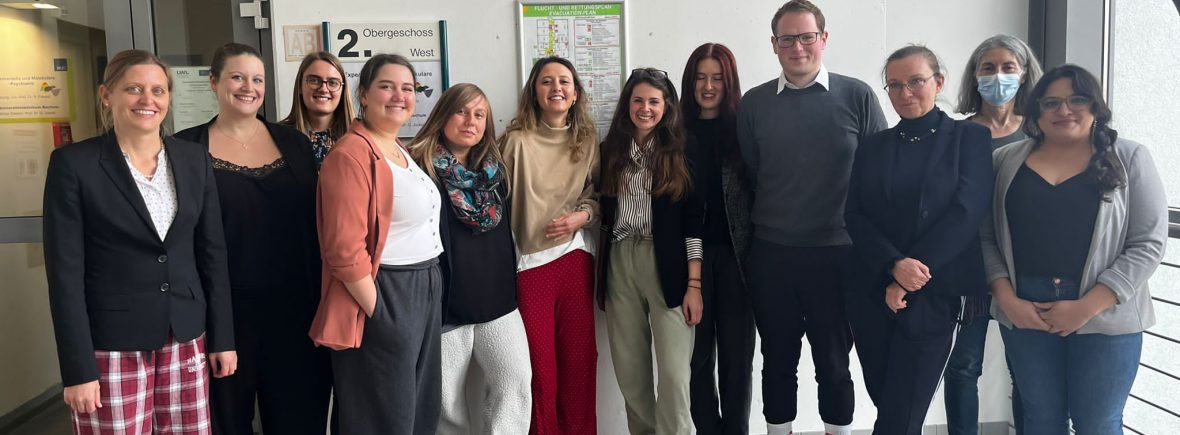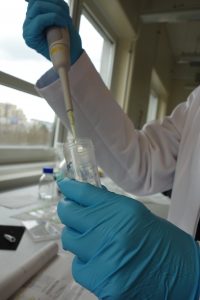
Jun.-Prof. Dr. Nadja Freund
I did my M.Sc in biochemistry and my PhD in psychology, both at the Ruhr-University in Bochum, Germany. During my PhD I worked on the development of visual asymmetries in pigeons. While I was very fascinated by the huge impact of the environment on brain development I also realized that I want to focus on more clinically related research. During a research visit at the University of Otago in Dunedin, New Zealand I conducted my first study with rats investigating the effect of alcohol on the developing brain. A postdoctoral fellowship from the Leopoldina allowed me to work at the McLean Hospital/Harvard Medical School in Boston, USA. Here, I have gained a greater understanding of psychiatric disorders and how to model behavioral aspects and the underlying neurobiology in rodent models. Bringing all these experiences together I was able to start my own research group investigating neurobiological mechanism of psychiatric disorders at the Clinic of Psychiatry and Psychotherapy in Tübingen, Germany. When I was offered the junior-professorship for Experimental and Molecular Psychiatry at the LWL-Universityhospital of the Ruhr-University in Bochum I was very honored to (together with my group) move ‘back home’. contact
Technical Staff

Jennifer Koch, Technical Manager
In 2009 I successfully achieved the grade as a technical research assistant at the Berufskolleg Olsberg des Hochsauerlandkreises.
Since then I worked for the lab for Experimental and Molecular Psychiatry at the Ruhr- University Bochum, which focuses on mental health disorders like schizophrenia and depression. My main parts are organizing the lab, supporting all our members and helping students whenever it is possible. contact
Research STAFF
How does the brain generate behaviour? This question has fascinated me already at school. Consequently, I studied Biology in Bochum and Bielefeld. During my diploma thesis, which was a classic embryological study dealing with the effects of teratogenic substances on early brain formation I became aware of the crucial impact of epigenetic factors onto brain development. I therefore decided to investigate the influence of sensory stimulation onto visual asymmetries in pigeons during my PhD thesis in Konstanz and Bochum. Left-right differences in neuronal structure and processing constitute a core principle of the functional brain organization in the animal kingdom and their emergence illustrates how genes and environment cooperate to generate efficient and environmentally adapted behaviour. I follow this line of research up today with the help of several DFG funded projects interrupted by work on adult neurogenesis in mice (Department of Molecular Neurobiochemistry, Bochum) and appointments as acting professor in Wuppertal, Hagen and Bochum. I habilitated 2007 in Cognitive Neuroscience at the Ruhr-University and achieved an appointment as extraordinate professor 2013. As a member of the Experimental and Molecular Psychiatry group, I will conduct a DFG funded project to understand how two (specialized) brain hemispheres communicate to enable adaptive decisions and behavioural control and how gene-environment interactions during ontogeny shape the underlying intra- and interhemispheric processes. Results may allow generating experimental approaches, which will help to unravel the neurobiological foundations of psychiatric disorders.
contact
My main research topic is the development of immune-induced schizophrenia. I use an animal model and cell culture to investigate the effects of prenatal immune reactions on microglial activation and brain development. Microglia are the resident immune cells of the central nervous system (CNS). They derive from primitive myeloid progenitor cells and can be detected in the brain at early developmental stages. Their functions during early brain development remain poorly understood. It has been suggested that microglia could play a role in the proliferation and development of the progenitor cells and could consequently influence neurogenesis and astrogenesis To study progenitor-microglia interactions in vitro we etablished a coculture of primary neural stem cells (NSCs) and immortalized microglia. The objective of our study is to investigate the effects of microglia on NSC proliferation, survival, phenotypic and genotypic changes related to differentiation patterns under physiologic and pathologic conditions.
Methods: Cell Culture, RT-PCR, Western Blot Analysis, ELISA, Immunofluorescence staining and microscopy, flow cytometric analysis. contact
PhD Students

Kirsten Schmerder, M.Sc.
Brains get sick too. I never understood the stigma around mentally ill people, how talking about depression or anxiety or mania remains taboo. How people wish you a fast recovery after you suffered from a heart attack or broke your leg, but you are talked about behind your back instead of being sent flowers when you’ve admitted yourself to a psychiatric ward. It always made sense to me that an organ as complex as the brain can sometimes stop working properly. I started studying neurobiology because it has always been so fascinating for me to learn about functioning, but also especially malfunctioning brains. When I had the opportunity for two internships and later on a master’s project at Nadja’s lab in cooperation with Olivia Masseck’s lab at the University of Bremen, I was eagerly excited to work with animal models for bipolar disorder. During my PhD, I will continue my research and hopefully deepen our knowledge about neurobiological processes during depressive and manic episodes in bipolar disorder models. In this context, I will try to implement optogenetic approaches to be able to interfere with the dopaminergic system during behavioral assessment. contact
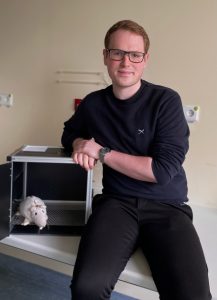
Patrick Reinhardt, M.Sc.
In progress
 In progress
In progress
MD STUDENTS
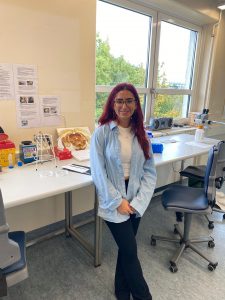
Julia Aslan
I started studying general medicine in Hungary and later on transferred to the Ruhr-University Bochum. During my studies, I was most fascinated how the brain works and how it is interconnected. I am intrigued how small changes in the nervous system can have an immense effects on (mental) health. The research focus of my tehsis will be on bipolar disorder. Specifically, I will investigate the connections between different brain regions and their impact on alterations in hedonic behavior in a rat model for bipolar disorder. contact

Rona Häring
I have always been interested in addictive disorders since it affects the lives of so many people and those affected are often confronted with negative prejudices regarding their disorder. But alcohol dependency is actually a very widespread disorder in Germany and is often overlooked in the clinical everday life and is only detected when it has already caused physical harm. I was often wondering: Why do some people tend to alcohol dependency and some do not? In additon to environmental factors, also the genetic plays a huge role. Are there variances in the brain, that predispose to alcohol dependency or does alcohol lead to specific changes in the brain? I want to pursue those questions by examinating brains of alcohol addicted rodents. contact
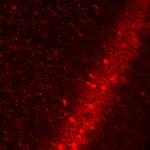
Mate Abraham
I have always wondered how our thoughts and memories form and how we could examine them. The possibility of exploring the material correlate with our mind has always fascinated me. Whilst studying medicine clarified many of my questions, the answers led to yet another issue concerning the mind: what happens when something goes wrong with our thoughts? And is it possible to somehow examine this? From this point on, it was only a matter of time until I would join the Freundlab to investigate these questions.
An important tool for my project is the rodent model of maternal separation. I especially focus on neuroinflammation and neuronal alterations in maternally separated rats in brain structures associated with depression, such as the hippocampus or the amygdala during development.
M.Sc. students
B.Sc. Students
Arina Demidova
